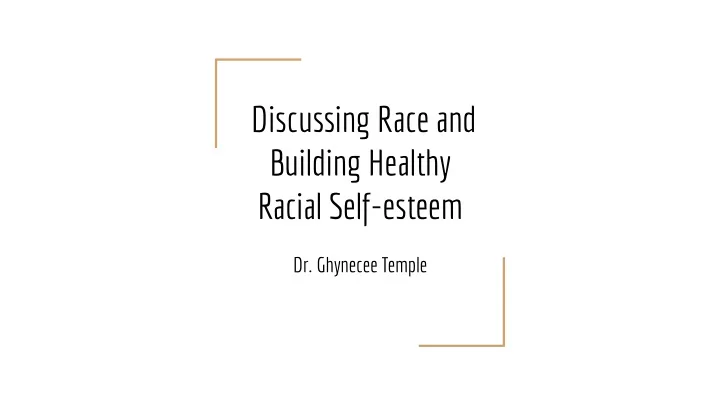

Discussing Race and Building Healthy Racial Self-esteem Dr. Ghynecee Temple
Why it’s important to talk about race At age 2-and-a-half, children can start developing and observing racial biases they see in the world around them. “Once they get to age 4 and 5, it’s a critical time when White children, for example, begin to exhibit obvious bias,” says Dr. White. “And Black children or children of color begin to feel discriminated against because of their skin color.” -Dr. Aisha White, Director of the P.R.I.D.E Program within the Office of Child Development at University of Pittsburgh
Parents, Caregivers, Educators...etc. Important to have awareness of our own privileged and marginalized identities ● We exist and operate in the world through these lenses because of societal systems ○ These identities exist within the spaces we occupy with the youth ○ We may hold biases or beliefs that may translate onto the youth ○ Extend this awareness to our youth ● A colorblind attitude is HARMFUL ○ Although the youth may not be fully aware of their identities, they still do exist ○
Pamela Hays ADDRETSING model “ Recognizing where you hold privilege is important because the areas in which you have privilege are those in which you are most likely to lack awareness and knowledge regarding members of the related minority groups that do not have such privileges.” ● There is also a complexity of holding both marginalized and privileged identities.
Understanding our blind spous, biases, etc. Understand that shame, guilt, ● embarrassment, anger, confusion, etc. may occur when examining your Personal therapy ● identities Process in groups ● Socialization impacts our ● Self-compassion ● self-examination Trainings, workshops, etc. ● Journaling ● This process takes time ●
What is Racial Self-esteem? Racial Identity- Identification with people in a racialized group ● Important to understand that race is a social construct which is not based on any ○ biological factors. It was used to categorise phenotypical differences between humans, but has evolved into a tool for oppression and violence. Self-esteem- Based on our own personal values, internal judgements, and ● external sources Racial Self-esteem - How we feel about our membership within a given ● racial group Positive identification reduces negative psychological symptoms such as depression and ○ anxiety Higher levels of racial self-esteem have been linked to positive academic performance ○
Tips to foster a healthy sense of racial self-esteem 1. Exposure to historical information and literature that highlights the positive contribution of members of differing racialized groups a. Decolonize the content 2. Discuss how they feel about their racialized identity a. Explore beliefs they hold about their grouping 3. Incorporate affirmations that emphasize personal strengths and characteristics a. Consistent positive messages about oneself can help boost self-esteem 4. Help them explore and process their own experiences of discrimination a. Remind them that these experiences are not due to personal deficiency, but are a symptom of societal injustice
Contact Email ghynmarie@gmail.com Youtube and IG @drghynnyfromtheblock
Recommend
More recommend